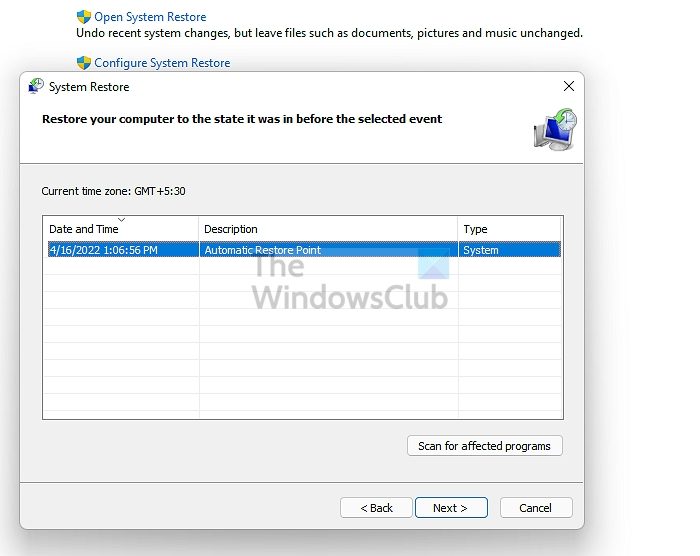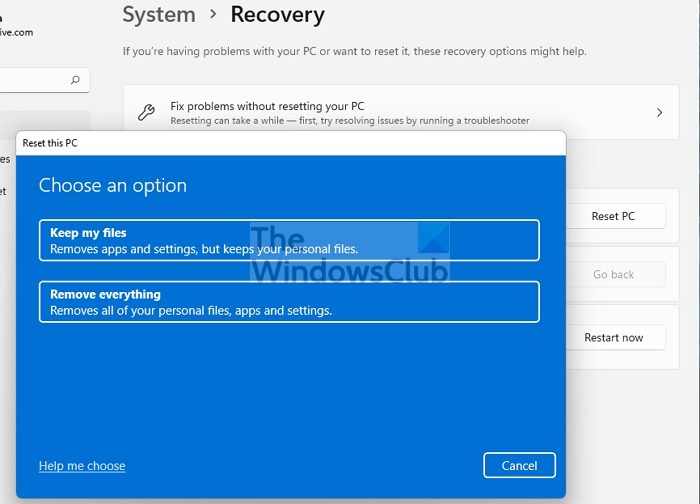The Windows Defender antivirus program, also known as Windows Security, comes installed with Windows 11/10. It is an antimalware scanning tool that lets you boot and scan from a trusted environment. Using it, you can protect your PC from viruses and malware and protect it in real-time. When a threat is detected, Windows Defender blocks and deletes it. However, some users have reported that Windows Defender offline scan is not working. If you are facing this issue, then read on.

What is Offline Scanning in Windows Defender?
Offline deep scanning allows users to detect any threats such as Trojan viruses, ransomware horses, and other malware that may not be seen by other antivirus programs when Windows is running.
Offline Scan works in the recovery environment. So whenever you choose to run an Offline Scan, the PC will reboot into Advanced Recovery. Once there, Defender will scan all the files for malware or virus or anything suspicious. It could take around 15 minutes, after which the PC will start.
Possible Problems why Offline Scan is not working
- Interfering Third-Party Security Software: Suppose you’re already using any third-party security software. Your Defender offline scan won’t work as the software clashes, and only one can work.
- Corrupt Windows Defender system files: The system files or core files of Windows Security may be corrupt, and hence it cannot start the offline scan.
- User account Permission Issue: If you are receiving an error—you need permission to perform this action—you do not have permission to run the offline scan. You will need an admin account to execute an offline scan.
Windows Defender Offline Scan not working on Windows 11/10
Now that we know the reasons restricting the offline scan, let’s figure out how to fix the problem.
- Uninstall Third-Party Security Software
- Launch with Admin permission
- Run DISM and SFC command to fix corrupt system file
- Run System Restore
- Use Reset This PC
- Restore from Backup
Some of these are troubleshooting methods, while the latter ones allow you to restore the PC to a previous state where everything was working fine.
1] Uninstall Third-Party Security Software
Any OS can have multiple Anti-virus software, but only one should be running. If you install two security software, it will create conflict. If you are already using third-party software, then offline scanning may not work. It would best that you uninstall or disable that security software and then use Windows Defender offline scan.
2] Launch with Admin permission
You will require an administrator account to launch this solution, and it won’t work with a standard account. If you’re using a standard account, a UAC (User Account Control) prompt will appear, asking you for Admin’s permission, and Standard users will need to enter admin credentials.
Read: Where are Windows Defender Offline scan logs stored?
3] Run DISM and SFC commands to fix corrupt system file
When a system file is damaged or cannot function properly, any program depending on it will not work. If either Windows Defender or any of its related files are corrupt, you need to fix it. It can be doner using DISM commands and SFC utilities. Follow these steps
- Right-click on the Start menu and select Windows Terminal(Admin) or Command Prompt(Admin)
- Type
sfc /scannowand press Enter. - System File Checker will start scanning and scan the entire system to check for corrupt or missing files. Once the files are detected, Windows will try and repair the corrupt files.
- If your Windows Defender still fails to run, try running a DISM scan and type
DISM/Online /Cleanup-Image/RestoreHealthin the command prompt and press the Enter key. - Once it’s complete, launch the Windows Security app and try running the offline squad.
Read: How to perform Windows Defender Offline Scan at boot time?
5] Run System Restore
The System Restore program takes a snapshot of a few system files and the Windows registry and stores it as a Restore Point. In case of installation failure and data corruption occurs, System restore can return the files to working condition without you reinstalling Windows.

- Press the Start menu and type Restore Point
- Click on the Recovery option from the search result
- Click on Open System Restore and then click on the Next button on the System Restore button
- The next screen will reveal the restore points available for the PC.
- Select one and then click on the Next button
- Click on the Finish button on the confirmation screen, and let the process complete.
You can also view the list of affected programs when you select a restore point. Ensure to check that to clearly understand what you may have to bring them back once the process completes.
Read: Windows Defender Offline Scan vs Full Scan vs Quick Scan explained
4] Use Reset This PC

if the SFC and the DISM tools don’t help, you are in a situation where you need to install the latest version of the OS while keeping your Apps and files. It is also called Repair Upgrade. If you find this new, the option also appears when you use Reset this PC.
- Open Settings using Win + I
- Go to System > Recovery
- Click on the Reset PC button
- Select Keep my files and then follow the rest of the instructions.
6] Restore Windows OS Image from Backup
System Image Backups help you create the image of current Windows. The images contain all the information about your PC in a particular state. So if you are already running a backup that can restore, you can try that as well. While the process is similar to System Restore, every user has a different backup method. So if you are running the Windows Backup or a third-party tool, use it to restore the PC to a state where things were working fine.
I hope the post was easy to follow, and you were able to fix Windows Defender offline scan not working on Windows 11/10.
Is Windows Defender enough to protect my PC?
You can always enhance security by installing a third-party antivirus program. We suggest you primarily use the Windows Defender as it has been ranked high in performance tests. However, if you are looking for more, ensure to go through the features and get feedback.
Why is my Windows Defender Antivirus turned off?
It might happen that Windows Defender is turned off or not working. This can happen because you have another antivirus app installed on your system. You should turn it off and uninstall this software/app before running Windows Defender, which creates clashes.
Read: Cannot or Unable to turn on Windows Defender
Why is Windows Defender not opening in Windows?
If your Windows Defender is not opening in Windows, it has detected another antimalware software. Make sure you uninstall it and restart your PC. If even after removing the third-party software from your PC, things still don’t work, you should reset the security app. Go to Start and type Windows Security, right-click on it and select App Settings. Scroll down, and you will find an option to reset. Click to Reset.
Read: Quick Scan not working in Windows Defender
How do I turn on Windows Security in Windows?
To turn ON/OFF the Window Security, Go to Start; search for Windows Security and click on it, after which you will see multiple options such as Virus & Threat Protection, Account Protection, etc. Click on Virus & Threat Protection. After that, check for Managed Setting under Virus & Threat Protection Settings pane and click on it. Now you will see Real-Time Protection which has a toggle switch on. Now you have to turn on Windows security in Windows.
Read next: Windows Security in Windows 11 not opening or working.
How to reinstall Windows Defender in Windows 11/10
To reset Windows Security or reinstall Windows Defender in Windows 11/10, execute the following in an elevated command prompt window:
PowerShell -ExecutionPolicy Unrestricted -Command "& {$manifest = (Get-AppxPackage *Microsoft.Windows.SecHealthUI*).InstallLocation + '\AppxManifest.xml' ; Add-AppxPackage -DisableDevelopmentMode -Register $manifest}
Hope this helps.
Leave a Reply